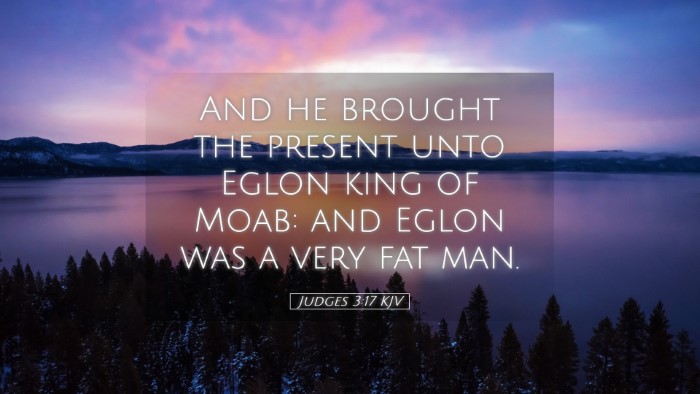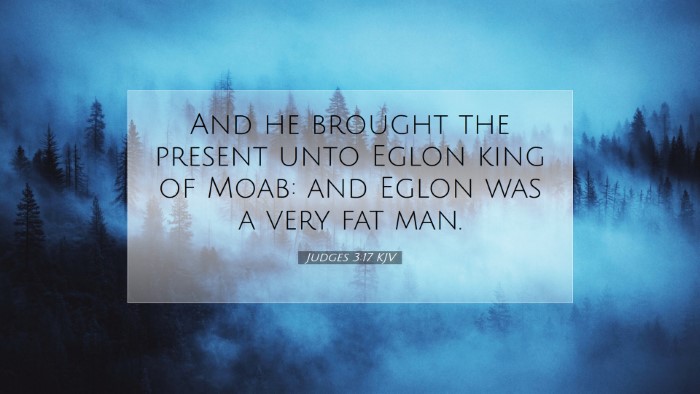Commentary on Judges 3:17
Judges 3:17 states, "And he brought the present unto Eglon king of Moab: and Eglon was a very fat man." This passage is rich in narrative and theological significance, addressing themes of oppression, deliverance, and God's providential care.
Contextual Background
The Book of Judges provides a historical account of Israel during a turbulent period between the death of Joshua and the establishment of the monarchy. This context of cyclic disobedience and oppression highlights the recurring need for divine intervention.
In this instance, the Israelites are under the oppressive rule of Eglon, the king of Moab. This passage serves as a reminder of the consequences of Israel's turning away from God, having been left to face the consequences of their idolatry.
Analysis of the Verse
In focusing on Eglon as "a very fat man," the text draws attention not only to his physical stature but also to the symbol of excess, emphasizing his indulgent lifestyle parallel to the oppression he enforces upon Israel. Fatness in the ancient context often represents wealth, power, and, ironically, the decadence leading to downfall.
Matthew Henry's Insights
Matthew Henry reflects on the symbolism inherent in Eglon’s body image. He notes that this description sets the stage for the dramatic reversal of fortunes to follow. Henry points out that the prosperity of tyrants is often temporary and that God’s justice will ultimately prevail.
Albert Barnes' Commentary
Albert Barnes emphasizes the narrative technique used by the author of Judges. The way Eglon is described serves a twofold purpose: it highlights his power yet foreshadows his vulnerability. Barnes elaborates on how this characterization of Eglon prepares the reader for the irony of the hero, Ehud, who outsmarts and overcomes this seemingly invincible oppressor.
Adam Clarke's Perspective
Adam Clarke comments on the context of tribute in ancient Israel, noting that Ehud’s presentation of tribute to Eglon is not merely about material goods, but also involves a subtext of submission and servitude. Clarke asserts that the act of bringing tribute sets up the circumstances that lead to Ehud’s later actions, which play a critical role in Israel's deliverance.
Theological Themes
- Divine Providence: The narrative illustrates God's sovereignty over nations and leaders. The very oppression by Eglon leads to the rise of Ehud as a chosen deliverer.
- Irony and Justice: The physical characterization of Eglon becomes a tool for literary irony. The text sets up the expectation that someone as powerful can never be brought low, yet it is in this assumption that God's plan unfolds.
- Human Agency: Ehud’s cunning and decisive actions highlight the significance of human choice within God's providential plans. His role in the deliverance narrative invites reflection on our own responses to tyranny and injustice.
Lessons for Today
For pastors and theologians, this passage serves as an invitation to reflect on the areas in which oppression still exists today. Just as Israel found itself under Eglon’s tyranny, modern believers are called to confront injustice in various forms globally.
Moreover, the story prompts reflections on the nature of God’s deliverance, reminding us that it may come in unexpected and unconventional ways. The use of a left-handed man is particularly significant, suggesting that God often chooses unlikely individuals to execute His will.
Conclusion
Judges 3:17 invites readers into a deeper understanding of God's sovereignty, justice, and the call to action against oppression. By synthesizing insights from esteemed commentators, we gain a fuller perspective that resonates with the challenges faced by faith communities today. The passage reminds us that God can transform our challenges into opportunities for deliverance if we respond in faith and courage.


